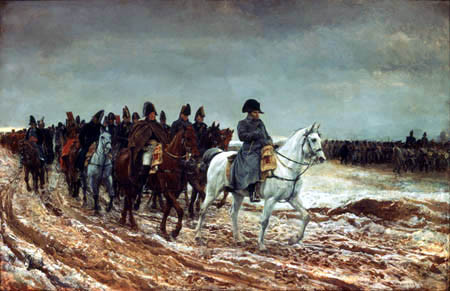
Napoleon Bonaparte discusses breeches, horsemanship, George Washington and military strategy. The Interview.
Not long ago, I came across a good looking pair of riding breeches while poking through the clothes racks of a local tack shop. Labeled the “Napoleon,” they’re were a blend of high-tech comfort and traditional old world elegance, made by the Italian riding apparel manufacturer Amino.
Still, I hesitated to try them on. After all, labeling a garment after someone who in real life appeared hawkish and paunchy looking didn’t make sense. And worse from a rider’s viewpoint is the fact that Napoleon never looked good in the saddle, always slouching—unlike George Washington who at 6’3” was far more straight-backed and imposing on horseback, although no one as yet has named a pair of breeches after him to my knowledge.
But rather than cast aspersions upon the dead, I am of a mind to allow France’s most ardent expansionist an opportunity for a rebuttal. Below is my interview with Napoleon Bonaparte on the subject of breeches, horsemanship, George Washington and military strategy…some of which is in the emperor’s own words.
CM: An Italian garment manufacturer has labeled a style of breeches after you. They’re terrific looking, real stain stoppers, too. But I’m curious to learn your own personal taste in ‘bum clingers’. Is it true you lean toward the simple?
NB: My taste in breeches is unembroidered and plain—a high waistband with adjustable lacing in back and solid but flexible stays, providing a tight fit, yet with ample room for the thighs. My side buttons are common and cloth-covered, without ornamentation. Beyond that, I attire myself in simple top boots, grey cloak and bicorne hat. This is, after all, the Revolution. One must not seem to be too ostentatious.
CM: Sure, makes sense. So, do you prefer your breeches white or beige?
NB: White.
CM: Perfect for hunt, parlor or parade. Tough to get those battle stains out, though. I’m curious, what animal hide are your breeches cut from—buckskin, doeskin or chamois leather?
NB: Doeskin. I find it best for wet, winter campaigns.
CM: Yes, that soft hide really clings to your body in a downpour, gives you that second skin we all look for when we ride. I understand General Washington likes his breeches cut from Elk hide. No doubt you’ve heard of him. He led the campaign against the British. We consider him the father of the colonies.
NB: I know of him, and also of the tough skin required to survive in the wilderness.
CM: I’ll say this about General Washington, he really knows how to sit flat-backed on a horse. Thomas Jefferson considers him one of the finest horseman of his time. And Jefferson is no slouch in the saddle either. What about you, General Bonaparte, do you think of yourself as being a good rider?
NB: I am untiring and vigorous upon my mounts.
CM: So I hear. Your groomsman claims you’re pretty tough on your breeches, wearing them out in spots as a result of, shall we say, a less than close contact with the horse. Do you think your lack of steadiness might have something to do with that famous, hand-in-the-pocket pose you so enjoy?
NB: My dear lady, I assure you, my campaigns produce hard wear in the saddle. And as for my ‘hand-held-in’ posture, it is one assumed by all men of good breeding. It suggests manliness without presumptiveness. And Washington, you will note, upon taking the measure of the man, has narrow shoulders and is in fact, slightly stooped.
CM: I meant no offense. After all, you and Washington have a good deal in common; you’re both leaders of a revolution, both horse lovers, both recipients of grateful nations as you like to say. Although, not to split hairs, you are an emperor and he’s merely an elected president.
NB: What is a throne — a bit of wood gilded and covered in velvet. I am the state— I alone am here the representative of the people. And do not forget madam, we are both haters of England—a nation of shopkeepers.
CM: And with the worst teeth of anyone on seven continents. How they’ve managed to corner the market on agrarian class snobbery is beyond me. I mean, we have plantations and good teeth here, although poor General Washington has to wear dentures. Word on the street is that they’re a combination of horse and donkey teeth, not made from wood as some might believe.
NB: From the sublime to the ridiculous is but a step. On the matter of the British, madam, I would advise your general to attempt to ruin them in trade.
CM: That won’t work. Washington still has his clothes tailored in London. But don’t tell anyone.
He insists that we colonists have been subject to British prejudice for way too long.
NB: Alas, madam, some of my officers lean toward British tailoring, cloth and boot. The cursed English—fixed in their ways like mules.
CM: Speaking of mules, I understand you grew up learning to ride on them.
NB: Yes, in Corsica, where the terrain is rocky, both donkeys and mules are sensible to ride.
CM: True enough. By the way, kudos on you having secretly commissioned a portrait of yourself astride a white Arabian stallion instead of the long-suffering mule who actually bore you across the
Alps on your campaign against Austria.
NB: What is history but a fable to be agreed upon.
CM: Or a great pr campaign taken hold. Can’t blame you for choosing a white Arab though. What magnificent creatures, small wonder you prefer them to Thoroughbreds under saddle.
NB: My Arabian horses have served me well on all my campaigns, although it is to the Thoroughbred that our Norman Cobs are bred at the French National Stud, their combination producing good type and bone.
CM: You founded the French National Stud to support your military campaigns, true?
NB: Under my command, the Haras Nationaux has become the very model of greatness.
CM: Your riding master says you like your mounts smallish, not only made, but impeccably well trained, with hugely docile temperaments—ideal for a busy military strategist like yourself seeking world domination. On that score, let me tempt to ask, toward that end, what is your overreaching strategy?
NB: The nature of strategy consists of always having, even with a weaker army, more forces at the point of attack or at the point where one is being attacked than the enemy.
CM: But didn’t that tactic cause you suffer horrific causalities in the 1812 campaign against Russia?
NB: There were forces of nature at work.
CM: All the hot weather, bad roads and hostile, barren terrain must have been tough on the 50,000 horses you took with you. I hear more than 10,000 died after the first month, many from starvation, particularly those bringing up the rear, foraging as they did, on land already overgrazed by the thousands of horses marching ahead of them. Poor souls.
NB: Horses are the life’s blood of our army. We cannot do without them.
CM: It’s reported that on average, France’s campaign toward greatness costs the lives of 100,000 horses each year, not to mention the human component. It must be horrific for your soldiers, so much death and carnage. How do you manage to keep your army intact during all these long, difficult marches?
NB: During the course of a campaign one must neutralize rumors and false reports, maintain a good spirit in the camp, and furnish matter for campfire talk. A leader is a dealer in hope.
CM: But leading nearly 700,000 soldiers into Russia and keeping them marching past cold, hunger and fatigue, beyond the weeks and months of misery, requires more than optimism. A person needs a certain capacity.
NB: If you wish to be a success in the world promise everything, deliver nothing.
CM: Speaking of military campaigns, a poll conducted by the National Army Museum in London has General Washington topping you as the most formidable military opponent ever faced by Britain. With
all due respect, why do you think that is?
NB: Waterloo set me back.
CM: How are you spending your time these days?
NB: I am engaged in building my house on Elba.
CM: Any plans for the future?
NB: I must find a way back to the people. My soldiers are loyal, we are joined by a common feat of arms,
equipped with the finest-bred horses on the continent.
CM: Just a suggestion, but if you’re really intent upon winning over the common people, you might consider breeding horses not just for military purposes, but also for farming, sport and leisure. Popularizing them could really strike a chord with civilian society. And the equestrian thing is really hot right now. In fact, with the right branding and your global outlook, you could really go far. Look at what Rolls-Royce has done with just one stallion, or Hermes a common carriage horse—and don’t even get me started on Ralph Lauren and polo.
You could brand yourself as Grande Armee Equestrian. We’re talking major merchandising—boots, breeches, helmets, although I’d lose the bicorne hat. That wouldn’t be a big seller here in the colonies. Think of it. You’d be iconic, able to re-establish France in the New World, put that whole Louisiana Purchase thing behind you.
NB: You forget madam, it was better to have sold the land to America than to Britain. And who is this Ralph Lauren, is he French?
CM: He’s American. People love his clothes. That British agrarian lifestyle really sells over here.
NB: Cursed shopkeepers, will England’s light never fade!


